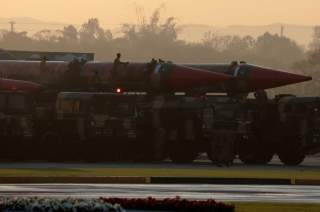Forget North Korea: Pakistan Might Be the Real Nuclear Threat
Could Pakistan be more of a nuclear security threat to Israel than Iran?
And that is why the Pakistani military views its nuclear weapons with such importance. For Islamabad, ensuring that nuclear weapons of all types — from stand-alone strategic weapons to tactical battlefield nukes — are primed and ready for use in a short period of time is a way to keep a vastly more powerful India in check. Unlike India, Islamabad has refused to accept a “no first use” doctrine, meaning that the Pakistani army is authorized to deploy nuclear weapons on the battlefield if the country’s national security is seriously at risk from an Indian incursion. Keeping the nuclear stockpile on stand-by is a way for the Pakistani Government to deter an India that is more populated, wealthier and has more men in uniform.
5. The Bottom Line
Despite all of the attempts from the nuclear non-proliferation community, Pakistan will continue to develop and strengthen its nuclear deterrent as long as the high brass in the Pakistani military continues to have an India-centric mindset in its defense policy. India and Pakistan have fought three wars since Islamabad’s independence in 1947, and in each case, the Pakistanis were the either the losers are forced into a stalemate before acceding to a ceasefire (the 1971 breakaway of eastern Pakistan, which would later be named Bangladesh, was an especially embarrassing defeat for the Pakistanis). Islamabad hasn’t forgotten these cases ever since. And for the Pakistanis, the lessons of these past conflicts are all the same: we cannot repeat history.
India-Pakistan relations remain a sore spot for both nations, from the ongoing and never-ending Kashmir dispute to allegations of meddling in one another’s domestic affairs (India continues to strongly believe that the Inter-Services Intelligence directorate fosters a deep partnership with a number of anti-India terrorist groups, while Islamabad has levied accusations about India’s covert connections with the Pakistani Taliban). With so much bad blood between the two, it’s unfathomable to believe that Pakistan would voluntary cap the number of nuclear warheads or agree to put its entire nuclear program under IAEA supervision. President Obama recognized this dynamic early in his presidency, telling Joe Klein with Time magazine that the Kashmir conflict is a constant irritant to peace in South Asia and that a special U.S. envoy may need to be appointed in order to prod both sides to start negotiating a long-term solution in a serious way. Progress on that front, however, has been nonexistent: violence in Kashmir still flares up occasionally, and with every death, the Indo-Pakistani relationship suffers another blow.
In the current environment, we all better get used to Pakistan becoming the third-largest nuclear weapons state in the world.


